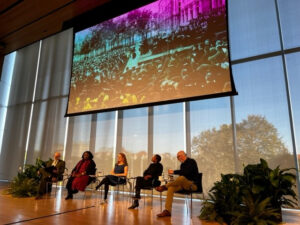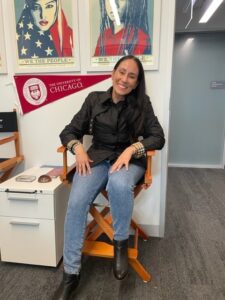Takeaways from UChicago Forum for Free Inquiry & Expression
October 20, 2023
Share

As I settled into my seat at the University of Chicago’s Inaugural Forum for Free Inquiry and Expression, I held the weight of the country in chaos: McCarthy ousted as speaker of the house, looming government shutdown, Israel and Hamas at war, democracy and freedom of expression at risk and questions surrounding the value of higher education. How do we realistically live, work, learn, and thrive together when it is starting to feel impossible? Although it feels overwhelming and quite difficult, I come back to hope as I pray and recall Archbishop Desmond Tutu’s words in my heart “My humanity is caught up, is inextricably bound up, in yours, Ubuntu” and then I remember there is much work to do.
As I waited for the seats to fill, saying hello to passing classmates and colleagues, I wondered how higher education would move beyond the current gloom and disparaging narrative. The field is unsure of its future, with skeptics mounting:
- A recent Gallup poll found Americans’ confidence in higher education has reached an all-time low, falling to 36%.
- According to a National Student Clearinghouse study, in the past decade, total college enrollment has dropped by about 1.95 million students, or by about 10%.
- College Board research shows that tuition has almost doubled for four-year private colleges and more than doubled for four-year public colleges since 1992. Student loan debt has ballooned to $1.6 trillion, a serious burden for many borrowers.
- A Constructive Dialogue Institute report found that 45% of college students, including 64% of conservative students, are “somewhat” or “very often” afraid to share their views out of fear of offending their peers.
Higher education institutions are unique places where one goes to investigate deep, complex questions. The academic environment frees the minds to think and innovate, which I have personally benefitted from. Here I was, at UChicago, with a privileged few, prepared to listen, and challenge ideas. The space, David Rubenstein Forum’s Friedman Hall, was as beautiful and rejuvenating as the conversations. The speakers on the agenda were interesting and engaging conversationalists. The event was true to its goal of advancing open inquiry, as it gathered diverse perspectives serving as a model for the important work ahead. It showcased that even when we disagree vehemently – as we should often do – we can still learn from one another and sometimes, if we choose, find a way to work together.
An established norm at the event and in my work at the Institute for Citizens & Scholars is challenging the idea, not attacking the person. It was refreshing to see Jonathan Haidt, professor of ethical leadership at the New York University, and Cathy Cohen, professor of political science at the University of Chicago, disagree on the effectiveness of trigger warnings. They shared ideas on what is helpful and productive, discussed the why behind the practice, and continued to respectfully disagree. In theory, this seems so easy and trivial, but in practice, it’s rare. It was exceptional to witness, and I observed how each person in the room took notice. Perhaps the solution is this honest, clear, and uncomplicated – we can disagree without dehumanizing one another.
As I review my notes from the two days of deep thinking, reflection, and questions, there are a few principles that have continued to resonate with me:
- Cultivate a serious conversation and ask deep questions about a topic or someone’s idea. The field of higher education’s goal is to produce knowledge, not merely more speech. We, as faculty, educators, and co-creators, want to help our students, and each other, ask better questions so we learn how to think, not what to think.
- As a leader, in whichever role you occupy, in or outside the classroom, you set the culture and the guardrails for engagement. Role model the behavior of inclusivity, viewpoint diversity, challenge, and care.
- Even though we increasingly live in a culture of individualism, education happens in community. Education isn’t only about self-preservation. “The lack of common good will be our demise,” said Mary Dana Hinton, President of Hollins University during her remarks. (I wonder if this also contributes to the broader untethering of our shared humanity?)
- We need to develop courage. Courage to speak out, challenge ideas, and be the first to lead.
Although there are many other nuggets in my pages of notes, these are the ones I’m thinking about most and bringing back to my work at Citizens & Scholars as we seek to develop young people who are civically well-informed, productively engaged for the common good, and committed to democracy. Our newly launched College Presidents for Civic Preparedness initiative is committed to addressing this challenge.
College Presidents for Civic Preparedness has brought together leaders from ideologically diverse institutions and pushed us to have serious conversations with unlikely alliances. As was similarly modeled at the Chicago Forum, we are drawing a larger circle and inclusive of all ideas – even those we don’t favor or agree with. With civic preparedness and democracy building as our common ground and North Star, we are modeling the way to work across differences. This is an entirely different strategy than the one we see play out on many college campuses and America at large.
Although this was the inaugural year for Chicago Forum and College Presidents for Civic Preparedness, decades of research, work, and engagement predate any of us, and there is something extraordinary in that. There is also an urgency, particular to our time, which none of us can deny. We all have a stake in addressing democracy’s most significant challenges and recentering civic preparedness in higher education.

Stay Engaged
Get More News
Join our mailing list to get more news like this to your mailbox.
Support Our Work
Help us invest in the talent, ideas, and networks that will develop young people as effective, lifelong citizens.
Ways to Support Us